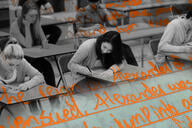You have /5 articles left.
Sign up for a free account or log in.
"We wouldn't dream of training doctors only from a book." In many ways, that quote from the dean of the law school at Washington and Lee University sums up a dramatic curricular change announced this week -- in which the law school is adding the equivalent at the very least of dissections, if not of medical residencies. The law school is completely replacing all academic courses in the third year of its program with "experiential" courses in which students will perform work equivalent to that done by lawyers.
"Our students need a wider range of skills" than they can pick up with strictly academic courses, said the dean, Rodney A. Smolla. While a number of law schools have added individual courses that are based on the experiential model, several law school experts said that they did not know of another example of a law school taking such a move with its entire third year.
If Washington and Lee is going beyond others, it is doing so at a time of considerable debate within law schools about whether a more practical orientation is needed. Last year, a report from the Carnegie Foundation for the Advancement of Teaching found a growing gap between legal education and the actual experiences a new lawyer needs, and called for major reforms of what students are taught.
Lee S. Shulman, president of the foundation, said that the Washington and Lee approach was "very consistent with our report," and he praised the law school for adopting such a dramatic change. Shulman said he has been hearing from many law schools interested in adding more practical preparation. He predicted that approaches would vary, with some law schools adding these courses throughout the three years of a standard degree, but not exclusively in any one year. "There are lots of approaches, based on missions and creativity," he said.
Carl C. Monk, executive director of the Association of American Law Schools, said he hadn't heard of any law school devoting a year to this approach. And he agreed that a variety of methods would soon be evident in law schools. "Legal education is not one size fits all," he said.
A good example of how third year courses will look at Washington and Lee can be found in the business law course led by Lyman Johnson, a professor who pioneered the experiential method at the law school and who helped prepare the plan to overhaul the curriculum. One of the first assignments in the class is for students to draft a deal for two entrepreneurs. The students would be given raw material (background on the business and the clients). They would then talk through with Johnson what information they didn't have but needed to do a good job. Then they prepare a draft deal of about 25 pages, and a memo of 6 pages to a senior partner in a firm, explaining why the deal was structured as they proposed.
Johnson said he would then give them detailed feedback, but not in the form of a standard academic evaluation, but of the sort the senior partner would give to a new associate. "The relevant standard is whether this work product is ready to go out the door," he said.
Since he started teaching this way, Johnson said, he has regularly heard from graduates that this was the course that set them up for successful work as lawyers, and that they wished they had been able to take more such courses. Johnson said that the plan going forward wasn't to eliminate the kinds of specialized electives that would normally be available in a student's third year, but to shift the subject matter away from traditional lectures and toward this approach -- whether the course is about business, taxes or the death penalty.
Smolla, the dean, said that over time, the shift may result in shifts in who is hired to teach. "I think there will be a gradual change toward a healthier mix of law professors who have had signiciant practice experience and law professors who fit the more classic academic mode," he said. At the same time, he added, that "many of our current professors have signed up to teach in this mode. It's not an either/or situation."




